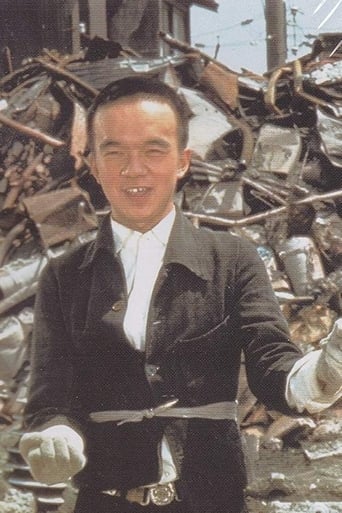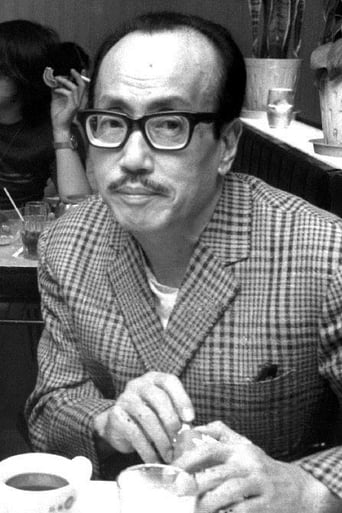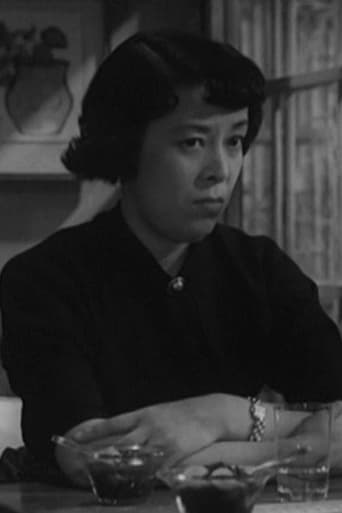Mjeteconer
Just perfect...
WillSushyMedia
This movie was so-so. It had it's moments, but wasn't the greatest.
Ogosmith
Each character in this movie — down to the smallest one — is an individual rather than a type, prone to spontaneous changes of mood and sometimes amusing outbursts of pettiness or ill humor.
Delight
Yes, absolutely, there is fun to be had, as well as many, many things to go boom, all amid an atmospheric urban jungle.
Frances Farmer
Let me start by saying I am a big fan of Japanese cinema generally and of Kurosawa specifically. I've seen many of Kurosawa's movies but for quite some time I resisted Dodes'ka-den. Based on the first half of the movie, my hesitancy about seeing it was well founded. I cannot comment on the whole movie because I became intensely frustrated and walked out around the midpoint.Dodes'ka-den shows people living in a junkyard somewhere in Japan. The characters are all very broadly drawn with no nuance in their portrayal. In other words, they are almost pure types: There are the two laborers who get drunk every night to the dismay of their slatternly wives; the urchin living in a car with his architecture-obsessed lunatic guardian; the nasty drunk and his semi-catatonic daughter who makes artificial flowers 20 hours a day; the aggressive nut job who picks fights; the catatonic nut job who likes ripping fabric into strips; the obsessive brush-maker and his slutty wife; the teenager who thinks he's a trolley driver and his highly religious mother....All of these people are hopeless misfits and outcasts; they display their various pathologies and vices ad nauseum during the film, and it wears thin pretty damned quickly...There is no plot; rather, the film consists of a series of vignettes of the characters being weird and/or nasty either on their own or in various combinations. The scenes alternate regularly from one person to the next and so the time passes slowly onwards. Realism isn't the point here, and there isn't a hint of narrative -- it is a fantasy, but to what purpose? The antics of the characters seem forced, mannered, repetitive and flat. There is no discernible social critique or message. I felt the movie was nearly a complete waste, much like the lives of the people it portrays.Again, these impressions are just from the first half of Dodes'ka-den. Perhaps something happens later that rewards the endurance (or passivity) of the hapless viewer who sticks around to see how it all ends up. I felt only the vaguest stirrings of curiosity about the ending as I raced out of the theater.If you are really patient or undemanding, or someone who wants to see absolutely every Kurosawa film, you might consider seeing Dodes'ka-den. But for those of you who have feasted on Kurosawa's earlier, better-known movies this title is likely to be a severe disappointment.
Luis Angel Gonzalez
An invisible train rides into a poor, gloomy neighborhood to show us the lives of its peculiar and unique dwellers. Dodeskaden stands for the sound of rail wheels as they advance on the track, although rather than real wheels, the sound is articulated by Roku-chan, the character that leads us to the place where the film unravels.The place, as I mentioned above, is inhabited by some really atypical people; we have two men that are very good friends to the extent they would exchange their wives so they can forget about their daily discussions for a while, as they usually arrive home drunk; There is a father living in the streets who often imagines building a mansion piece by piece in an unknown location, getting his son involved in the process; there is also a mysterious man who never utters a single word and whose presence is reminiscent of death itself. Characters like these are what make this film worth the watch (accompanied by superb acting).Any Kurosawa fan should not hesitate to pick this one up, they will surely find something of interest here.
lefaikone
This, and "Hidden fortress" are the Kurosawa's that are most dear to me. I don't hand out 10's like candy, but this certainly deserved it, if anything. Even though it's quite long (like all Kurosawa's pretty much are) it concurred the problem which bugs me with most of his films; the storyline is often too loose and slowly evolving, containing scenes that are unnecessary or just lenghtened too much without any real purpose to the storyline or the character description. Dodesukaden delivered to me the same experience that for example "Hidden fortress" did; despite its lenght, there wasn't a single minute I would cut out.This is also a very unusual Kurosawa film in a way, it has no storyline, but many little independent stories which are based more to the character description than storyline, unlike any other Kurosawa-film I have seen so far. It also leans much on the dialogue, which he uses brilliantly (especially in the story between the father and the son planning their "new house"). Still the thing that makes this one a masterpiece is how the subject being so tragic as it is, is managed to be described so humanely and sympathetically, without pointing fingers at anybody at any point. From the beginning to the end it delivers the whole emotional scale from laughter to tears in perfect balance.
notmicro
Its definitely not for everyone; a great artist, when he is experimenting, often alienates a large percentage of the public. For my money, its one of the more amazing films of all time, and contains numerous scenes which I can recall vividly; the now-over-the-edge of sanity father exclaiming "the house is finished!"; the stuttering husband defending his rude wife to his guests; the monk offering all of his possessions to a thief; and most of all the incredible closing scene, as the camera pans across walls covered with amazing color drawings of trolley-cars. The compassion Kurosawa shows for humanity is deep and profound; there is nothing else in the annals of film quite like the Buddhist-influenced post-WW2 works of the Japanese directors. There are many many millions of people on the planet today who do not live as well as this little community in the middle of their garbage-dump.







